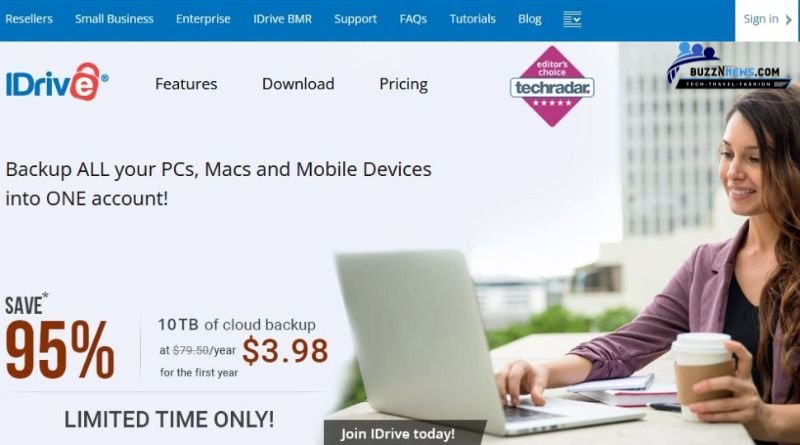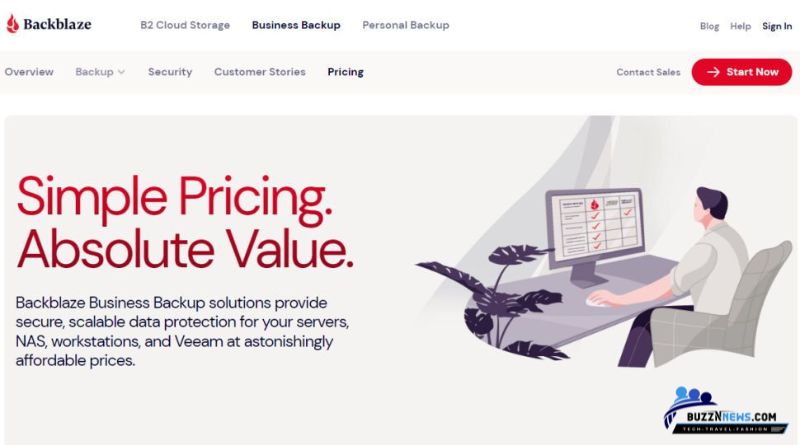The top cloud backup services to assure data accessibility
The finest cloud backup services enable backing up all of your files and folders to the cloud straightforward and quick.
Choosing the finest cloud backup solution is not always straightforward – but it is critical. When you mistakenly erase or lose access to your information, cloud backup services may save you a lot of worry and bother, especially if you need access from a range of different devices.
Many of the top cloud backup services also rank among the best cloud storage providers, indicating the growth of the cloud industry. Running frequent backups is crucial in business, just as it is for home users, particularly now that home and hybrid working has been embraced by many enterprises. The loss of even a tiny portion of their most vital data, even for a short period of time, might be disastrous. It is not only possible to suffer reputational harm. Failure to backup may result in very significant financial fines under privacy rules such as the European Union’s GDPR.
Of course, you may attempt to safeguard yourself by moving data to hard drives, robust SSDs, USB flash drives, or external hard drives, but this takes time and effort. It also exposes you to fire, theft, and device failure. Businesses may also use backup software in conjunction with a file sync solution, particularly if linked to a cloud storage provider, although this may not be as effective for bigger organizations. The top two cloud backup services are shown here, with the full list further down the page.
Given the growing danger of ransomware, selecting the correct backup solution might seem difficult. For example, how much storage space do you truly require? Versioning (keeping several versions of documents) must be supported by the service. How should this be dealt with?
Security is also crucial. What kind of encryption options are available? How is data access controlled? What alternatives do you have for controlling your users, monitoring what they’re doing, and ensuring they’re following your rules and procedures? Is it simple to recover and retrieve data as part of a disaster recovery solution?
You’re probably not going to get by with a free business account, but there are lots of business providers on all various sizes ready to supply the things you and your organisation want. Here are a few of my favorites.
Full list of the top cloud backups in 2022:
1.Google Drive
The greatest cloud backup service has become even better.
REASONS TO BUY:
- +Wide variety of systems supported
- +Simple web-based console
- +10TB by default
REASONS TO AVOID:
- -There is no two-factor authentication
- -There are no modest capacities available
IDrive is a flexible cloud backup service that tries its best to meet almost every demand, particularly because you receive 10TB of storage capacity.
You’re protected on PCs running Windows 2000 and later. There is support for Windows and Mac, Linux backup scripts, iOS and Android mobile clients, and backups for Windows Server, Microsoft SQL, Exchange, SharePoint, and Oracle.
The default storage of 250GB may not be adequate for everyone (especially corporate users), but hybrid backup capability – the option to preserve certain data locally – enables you to be more selective about which items go to the cloud and which remain close at hand.
Once your data is online, you can view it using a web interface, sync it with PCs or mobile devices, and even share files through email, Facebook, and Twitter.
IDrive Express is a function that allows you to backup or restore your system rapidly using a physically supplied disc. Surprisingly, the Business plan includes three free backups every year.
Despite all of this flexibility, the option to establish sub-accounts for your storage space and a simple web-based administrative dashboard help you stay on top of things.
Overall, it’s a pleasant bundle, and if money is an issue, try IDrive Personal. There is no server backup or sub-accounts, but you can get the basic functionality and 5GB of storage for free.
2.Business Backblaze
The most cost-effective backup option
REASONS TO BUY:
- +No capacity or bandwidth restrictions
- +Awesome feature set
AVOIDANCE REASONS:
- -Only mid-range backup performance
Back blaze has been providing simple, low-cost backup services to individuals for years, so it’s no surprise that its corporate offerings follow like.
There are no restrictions on capacity, bandwidth, or file size, for example. There’s no need to sift through numerous service tiers to find out what’s best for you: Back blaze Business is a single package that provides unlimited backup space for one machine at a fixed yearly cost.
The backup method is similarly simple, with the application first backing up all of your data – which may even be on external discs connected to the PC or on USB keys – and then backing up individual files as they change. Your data is then available online via an easy-to-use web interface and a mobile app.
Versioning is a bonus feature that preserves file changes for four weeks. On the security aspect, encryption is in place, as expected, and an anti-theft mechanism logs your computer’s IP address when it connects. Backup data may be transmitted anywhere in the globe on a flash drive or USB hard disc for quick recoveries. Backblaze will reimburse the whole amount if the drive is returned within 30 days.
The service now comes with several useful central management features. Admins may break users into groups for custom invoicing, check data about their backup status and preferences, and get trouble alerts.
Backblaze’s B2 cloud backup, an Amazon S3-like service that backs up servers and NAS, is even integrated in (B2 integration also allows for secure file sharing, should that feature be useful to you).
Back blaze provides decent mid-range backup performance, and although some corporate customers may like more, it will suffice for the majority of tasks. Overall, the features supplied for the membership cost, notably the absence of limits and limitless storage, make this service a terrific value proposition.
3-NordLocker
The most effective method for safeguarding and synchronizing files
REASONS TO BUY:
- +Very secure
- +Slick and user-friendly
- +Free for local files
REASONS TO AVOID:
- -Limited free plan space
When it comes to rock-solid security, NordLocker has you covered. It takes encryption extremely seriously, using the security community’s favourite Argon2, AES256, and ECC encryption methods (plus XChaCha20, EdDSA, and Poly1305). Everything is zero-knowledge – only you, with your master password, can decrypt your data (or recovery code).
You can use NordLocker for free if you can live with 5GB of cloud storage space – or if you don’t require online storage at all. There is no limit to the amount of local encryption you can do, so you can put as much as you like inside the NordLocker folder without fear (provided you don’t run out of disc space, of course).
As is customary with these services, you may pay in advance for a year or month by month for a substantially higher amount.
NordLocker works quite effectively and rapidly for encrypting data on a local drive, and the programme is well-designed, but it doesn’t do much more – this simplicity may be a plus or a disadvantage for you, depending on your needs.
4-pCloud
The greatest backup solution available with a lifetime membership.
Reason to buy:
- +No file size limitations
- +Extended file history
- +Desktop, mobile, and online clients
REASONS TO AVOID:
- -There are no cooperation features.
pCloud provides a regular backup and sync service in which your device’s data and folders are automatically backed up to the cloud and synchronized in real-time. Any modifications you make to files and folders on your device will be reflected in your cloud account.
When you remove a file from your device, it is immediately moved to the cloud trash folder, which is automatically purged after 30 days for paying plans (or 15 days with free plans). If you purchase the Extended File History add-on, you may preserve file versions up to a year old.
pCloud, like other cloud services, is a cross-platform solution featuring desktop (Windows, macOS, Linux) and mobile (Android, iOS) apps, as well as a web app. There’s a lot to appreciate here, but keep in mind that individuals looking for online collaboration tools won’t find them (pCloud isn’t alone in this regard, of however, and many people won’t want these capabilities anyway).
The price levels distinguish pCloud from competitors. You may pay yearly, like with other cloud backup services, but lifetime membership options are available, which might provide excellent value.
5.Dropbox Business
The greatest option when you want a variety of functions.
REASONS TO BUY:
- +Huge and infinite storage possibilities
- +Varied tools and functions
- +Storage and syncing
REASONS TO AVOID:
- -Not the most affordable service
Dropbox Business is another well-known cloud storage service that offers solutions for both people and corporations. While some individuals swear by the individual Dropbox plan, we’ll concentrate on the business options here.
Dropbox Business provides a large quantity of storage, with the most basic subscription giving a massive 5TB capacity. A single admin login is provided, as well as 180-day data retention, 256-bit AES and SSL/TLS encryption, user permission management, file locking, watermarking, and file synchronization.
The Advanced plan has limitless storage and supports file sizes up to 100GB. Aside from the features included with the Standard plan, there are a slew of team admin and administration tools, such as SSO, to make things easier. Overall, Dropbox provides a wide variety of options and a massive quantity of capacity, making it a viable alternative for any sort of cloud storage need you may have.
Choosing a Cloud Backup Service
Greg Lissy, Vice President of Products at Solar Winds MSP, discusses how organizations may choose the best cloud backup option.
A backup plan for a company is similar to an insurance policy for your data, so selecting the appropriate supplier is critical. Low-cost consumer-grade solutions may be appealing, but if your organization relies on data access, dependability is critical.
Examine the backup vendor’s track record and reputation. What do their clients think? How fast do they restore system functionality? How much downtime can you afford if anything goes wrong before your company suffers?
Another crucial factor to consider when selecting a cloud backup service is where your backups will be kept. Many firms must comply with legislative regulations for data retention in-country, so ensure that your provider can fulfil your data sovereignty needs.
Finally, it’s critical to understand that backup includes security and that backup is an integral component of your entire security strategy. Insist on safe data transmission to and from cloud storage, data encryption, and role-based access to guarantee that only authorized workers may access or recover data.
While backup is important, it is usually your final line of protection. Make sure it’s backed up by a strong defensive plan that includes managed antivirus, online protection, patch management, and email filtering. If a single vendor provides a comprehensive layered security portfolio, you’ll be in an even better position since you’ll have one trusted partner to turn to in times of need.
Why is data backup so important?
According to Check Point Research (CPR), with an increase in phishing and ransomware assaults, human error, and a higher dependence on the cloud and business networks, organizations must do frequent backups to secure their data.
Preventive methods are not always effective: As cybercriminals continue to target the remote workforce, businesses have begun to expand their cybersecurity strategy by implementing robust defense software for both the corporate network and the cloud, regularly updating systems and apps, installing a VPN and increasing levels of protection on employees’ devices, and providing cybersecurity training for workers. While these methods significantly raise a business’s degree of security, it is still conceivable that they will fail to halt an assault since hackers are continually developing new ways to circumvent the defenses. It is critical to have a backup strategy in place to ensure that no data is lost in the case of a cyberattack. If a firm is the victim of a double ransomware extortion attempt, having a backup system in place allows them to rapidly restore normalcy.
Cyberattacks are becoming more sophisticated: Cyberattacks are always developing, and hackers are continually looking for security flaws. Companies are often caught off guard by new ransomware, phishing emails, and malware. This is why, despite any upgrades or defensive measures in place, next generation cyberattacks might still get through and accomplish their goals.
Data theft jeopardizes a company’s reputation: Losing information through revealing consumers’ personal information may have irreversible effects for a company’s brand and financial loss. Allowing a customer’s personal papers to be hacked has resulted in lawsuit since GDPR was implemented a few years ago.
Another attack vector is the cloud: True, the cloud has provided significant benefits to businesses, such as cost savings and the ability to work remotely. However, putting data on cloud platforms expands the attack surface via which fraudsters might obtain access to the business network significantly. So, it’s a good idea, no, it’s critical, to do frequent manual backups of the information stored in the cloud, just in case anything beyond of the company’s control happens.
Internal threats might occasionally go undetected: Unfortunately, even with the strongest cybersecurity protections and protective software in place, user responsibility is essential. It is critical to teach personnel on the various cybersecurity tactics and approaches. One of the greatest defenses is to instill in staff the need of maintaining up-to-date backups in the case of an unplanned disaster or cyber-attack.
What criteria did we use to choose the top online backup services?
When we analyzed cloud backup services, we looked at their features as well as their service quality. Because there are so many factors involved in number-based tests like upload or download speeds, we simply notice any outliers as they are done (super-fast speeds or very slow performances). More essential to us are the overall experience of the service (whether using a web browser, a dedicated client, or a mobile app), security (file encryption, ransomware protection), and value for money.






